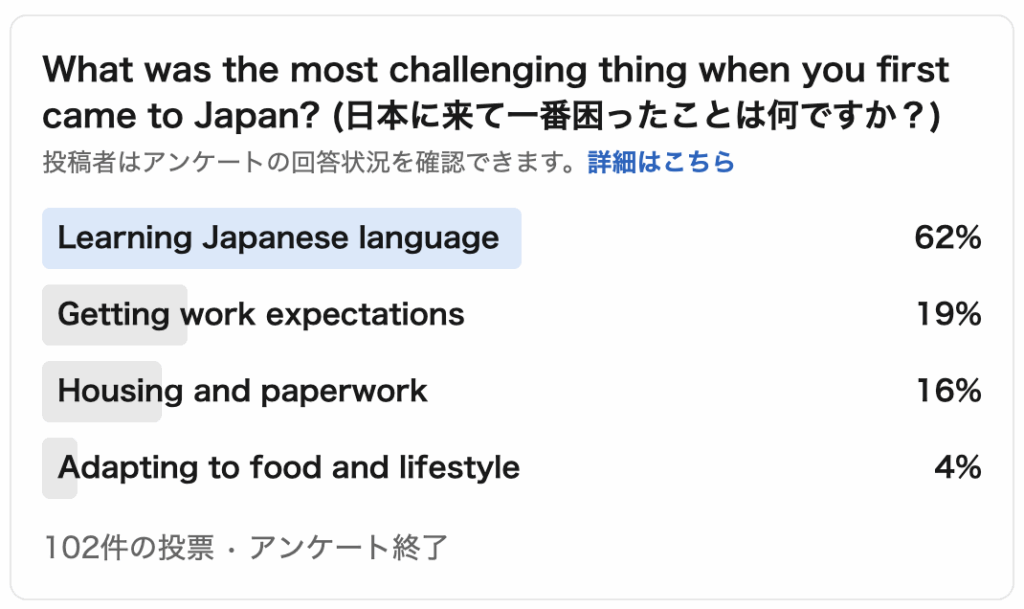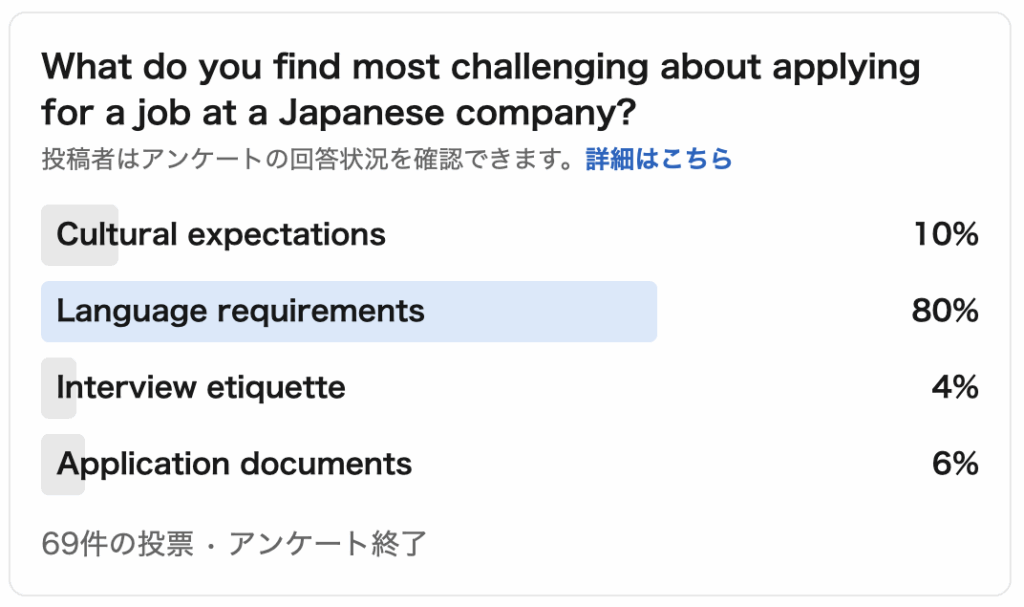Japan offers exciting opportunities for global talent—and more companies are opening up to English-speaking professionals.
But even so, one challenge continues to stand out more than any other:
the Japanese language.
1. The Numbers Don’t Lie: Japanese Is the Top Challenge
In two past LinkedIn polls we conducted:
- 80% of respondents chose “Language requirements” as the biggest challenge when applying for a job at a Japanese company.
- 62% said “Learning Japanese” was the most difficult part of coming to Japan.
 These were the most selected answers among four options—clearly showing that language remains a major obstacle.
These were the most selected answers among four options—clearly showing that language remains a major obstacle.
It’s not surprising. Japan, as a largely homogeneous society, still operates under the assumption that people speak Japanese—both in daily life and in the workplace. That can make the barrier feel even higher for foreigners.
2. Why Is Japanese So Important for Working in Japan?

- Many Japanese companies still see “Japanese language = immediate value”.
- Some workplaces have very few English speakers, and support for non-Japanese speakers may be limited.
- Miscommunication can lead to missed opportunities, misunderstandings, or being underestimated.
- “Language ability” is often seen as more than just grammar or vocabulary—it also means understanding Japanese culture and context.
3. But This Wall Isn’t Unbreakable
Here’s the good news: You’re not alone, and many have already overcome this challenge.
Numerous foreign engineers, designers, and professionals are now thriving in Japan.
Many of them say, “I could barely speak Japanese when I arrived. But I picked it up gradually through daily work and life.”
The key isn’t perfection—it’s progress. Learning happens through practice, exposure, and patience.
Just because you struggle with Japanese now doesn’t mean you don’t have value. If you have something worth saying, you’ll find ways to express it.
4. Tips and Resources for Learning Japanese
Practical Tips
- Focus on useful phrases, not just textbook grammar
- Build a daily habit—even 5 minutes a day makes a difference
- Try output: writing simple messages or speaking out loud
- Use fun materials: anime, manga, games, or podcasts you enjoy
Useful Tools & Platforms
- Apps: Duolingo, WaniKani, Bunpro
- Language Exchange: HelloTalk, Tandem, local meetups
- Courses: JLPT-focused programs, or community based classes such as 東京日本語教室サイト
5. More Important Than Fluency: Your Attitude
A willingness to learn goes a long way in Japanese workplaces.
Even basic Japanese, combined with a positive attitude, often earns more trust than expected.
During job interviews, employers aren’t just evaluating your current language level—they’re looking at your mindset and adaptability.
Watch these 2 videos for your Interview preparation!
Japanese Interview Preparation 1【Basics & Manners】
Japanese Interview Preparation 2【FAQ & Key Points】
You don’t need perfect Japanese. What matters is your willingness to learn, communicate, and grow.
Japanese may seem like the biggest challenge. But that doesn’t mean it’s impossible.
Step by step, day by day, every effort you make to learn the language opens up more career opportunities and deeper connections in Japan.
Keep going—you’re closer than you think.
Interested in IT-related opportunities in Japan?
👉 Check out our job board for the latest openings!















